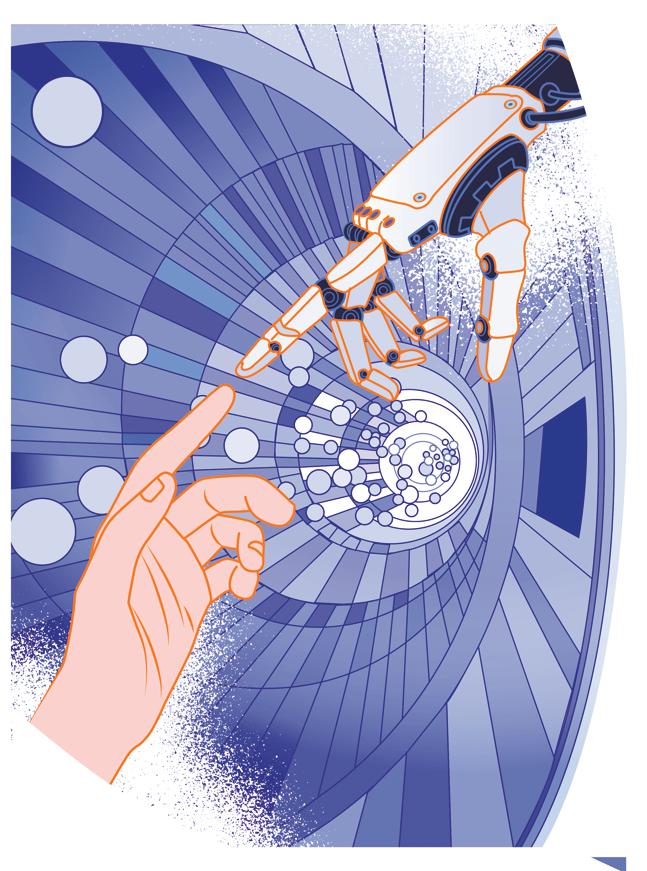
- Home
- Media Center
-
Events
- Wuzhen Summit
- Regional Forums
- Practice Cases of Jointly Building a Community with a Shared Future in Cyberspace
- World Internet Conference Awards for Pioneering Science and Technology
- The Light of Internet Expo
- Straight to Wuzhen Competition
- Global Youth Leadership Program
- WIC Distinguished Contribution Award
- Membership
- Research & Cooperation
- Digital Academy
-
Reports
- Collection of cases on Jointly Building a Community with a Shared Future in Cyberspace
- Collection of Shortlisted Achievements of World Internet Conference Awards for Pioneering Science and Technology
- Reports on Artificial Intelligence
- Reports on Cross—Border E—Commerce
- Reports on Data
- Outcomes of Think Tank Cooperation Program
- Series on Sovereignty in Cyberspace Theory and Practice
- Other Achievements
- About WIC
- 中文 | EN

Public views sought on new AI draft rules

[Shi Yu/China Daily]
Guardrails proposed to ensure the safe development of high-tech services
Solicitations on draft measures addressing emerging artificial intelligence services opened to public opinion on Tuesday, aimed at regulating the application of the new technology and promoting its healthy development in China.
The 21-article draft on managing generative AI services was published and opened for comment by the Cyberspace Administration of China, the country's top internet regulator, on its website on Tuesday.
Those interested can also visit two other websites — moj.gov.cn and chinalaw.gov.cn — to share their ideas on the draft, the administration said, adding that the advice and opinions can be submitted until May 10.
The draft was drawn up in line with the Cybersecurity Law, Data Security Law and Personal Information Protection Law as well as administrative rules, stating that the country supports innovation, promotion, use and international cooperation on AI algorithms and other basic technologies, and encourages priority use of secure and trusted software, tools, computing and data resources.
It underscores that content generated by AI must not subvert State power, nor incite overthrowing of the socialist system or the destruction of national unity.
Content created involving terrorism, extremism, ethnic discrimination and hatred, violence, pornography and fake information is also prohibited, as is anything that might disturb the economic and social order, according to the draft.
"It's timely to draft such measures amid many enterprises from home and abroad ratcheting up efforts to integrate AI-powered chatbots into their products and services," said Zheng Ning, head of the law department at Communication University of China's Cultural Industries Management School.
As AI-related technologies have rapidly grown, such as ChatGPT, an AI chatbot developed by Open-AI, "some problems in this area have also been emerging and need to be solved", she added.
Noting that the draft is a quick response to the new industry, she said that it tells those studying and using generative AI where the boundaries are and what should be paid attention to in its development.
"Simply put, it's a necessary guide for the future of the field," she added.
"While allowing government departments to supervise and regulate the industry by drawing a bottom line for AI technology or service providers to guarantee their content does not harm the country, the draft also needs to help promote industrial development," she said.
Generative AI refers to algorithms trained with huge amounts of data that are able to generate content such as images and text. As ChatGPT takes the tech world by storm and triggers a new wave of AI, a host of Chinese tech giants, including Alibaba and Baidu, have also began rolling out ChatGPT-style products.
Alibaba, for example, said last week it has invited enterprise users to test a self-developed large model called Tongyi Qianwen. Last month, Baidu unveiled its large language model and Chinese-language ChatGPT alternative, Ernie Bot, which could be implemented in a variety of functions including searches, autonomous driving and smart devices.

The World Internet Conference (WIC) was established as an international organization on July 12, 2022, headquartered in Beijing, China. It was jointly initiated by Global System for Mobile Communication Association (GSMA), National Computer Network Emergency Response Technical Team/Coordination Center of China (CNCERT), China Internet Network Information Center (CNNIC), Alibaba Group, Tencent, and Zhijiang Lab.





